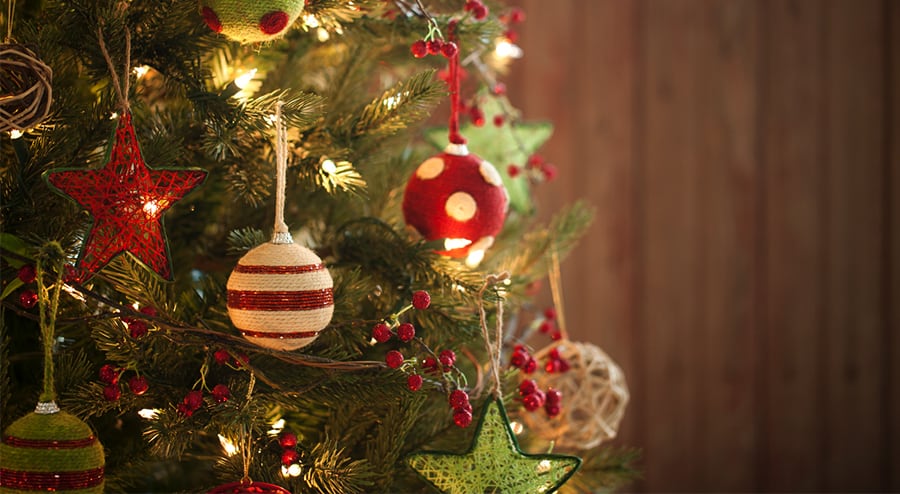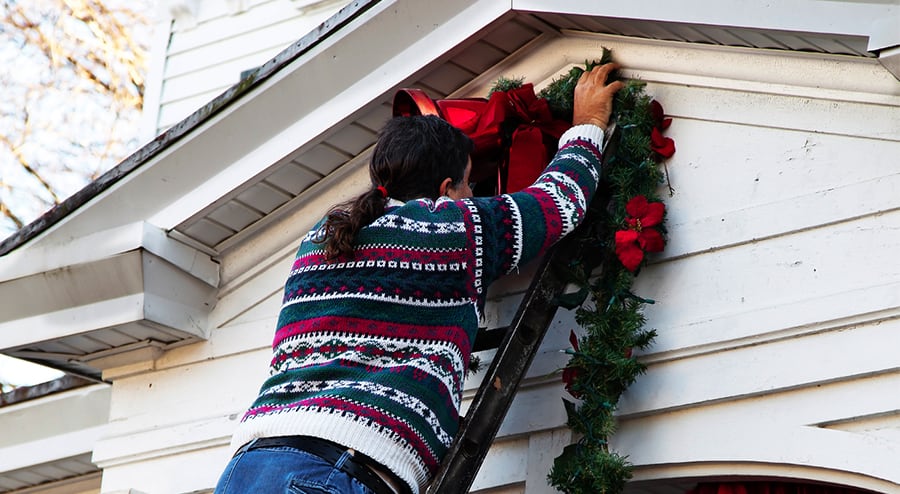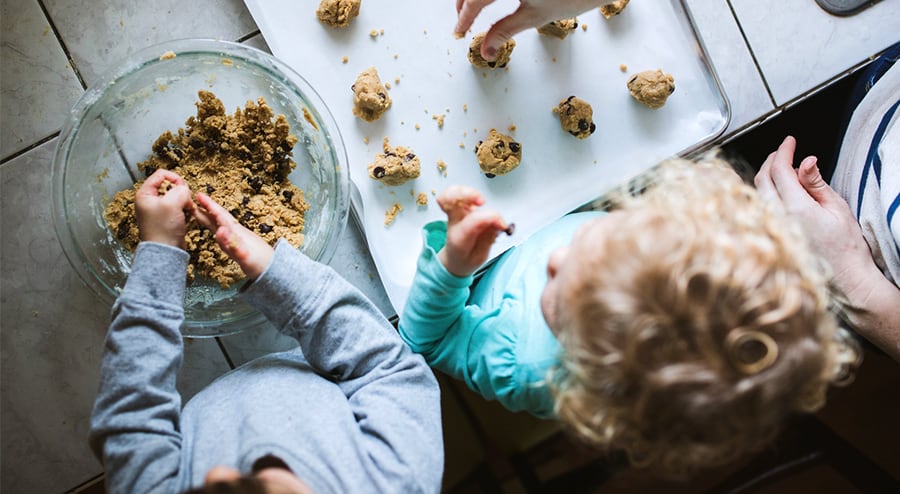The holidays are a wonderful time of year, but by their very nature holidays can bring increased risks to your home. Because thieves take advantage of vacant houses, for example, we see more burglaries around the holidays. And even when we’re at home, the increased activity in our homes leads to increased risks of home fires, injuries and more.
The best way to have a worry-free holiday season, then, is to understand what risks you face and act to prevent them. Only then can you ensure your home, your family, and your pets remain safe — from that first turkey dinner to when the last string of holiday lights comes down.
Lighting: Safety Before Beauty
Simply putting a lot of lights on your tree won’t make it hot enough to go up in flames. But that doesn’t mean that you shouldn’t be mindful of the risks posed by misusing holiday lights. Overloads caused by stacking multiple plugs on a single electrical outlet can cause problems—and although you’ll just end up flipping a breaker in most cases, taking that attitude puts you just one failed breaker away from wiring damage or, possibly, a house fire.
You can mitigate these dangers in several ways:
- Use power strips. These often have their own built-in circuit breakers to prevent overloading your household wiring.
- When you use a power strip, only use one plug per socket, as this will protect against surges.
- Employ extension cords to avoid stretching plugs, which can pull them out of the socket, expose their prongs or wiring, and create a shock risk.
Preventing Home Fires at the Holidays
Home fires are more common at Christmas. Fires caused by candle use, for example, are almost four times more likely during the end-of-year holidays, and other risks increase as well. This is due to a number of causes. For one thing, people simply have more fires and burn more candles. Simple accidents or acts of neglect, such as knocking over a candle or forgetting to tend the fire, can cause a rug, a set of drapes, or a tree (highly flammable after a few weeks) to catch fire, and such fires can spread to other areas of the house.
Here’s how to be safer:
- Stack wood carefully away from the fireplace so it can’t catch easily.
- Keep tinder enclosed or out of reach of any sparks that could be thrown out of the fire.
- When using candles, don’t burn them for more than 4 hours. “Resting” candles gives them time to recover their shape, preventing hot wax from spilling.
And unless your family traditions will suffer, avoid using a turkey fryer. Fox News reports that “Every year deep-fryer fires are responsible for five deaths, 60 injuries, the destruction of 900 homes, and more than $15-million in property damage, according to the National Fire Protection Association.”
To avoid creating more hazards than necessary, you should also choose your tree with fire safety in mind:
- Choose a Christmas tree that has at least two feet of clearance beneath your ceiling
- Trim the tree branches so that your tree fits in a corner without brushing the walls or furniture.
- Cut branches far enough away from the ground to allow for proper ventilation even after presents begin to accumulate.
All of this will help prevent a fire from spreading as quickly as it otherwise would.
You should also have your chimney cleaned regularly. Otherwise soot and and other debris can build up and cause fires as well. To be on the safe side, even if you’ve just checked all your smoke and carbon monoxide detectors, check them again around the holidays.
Slips and Falls
Winter is a slippery time. In some parts of the country, walkways are covered in snow and ice, making the mere act of walking to the recycling bin an exercise in caution. In others areas, winter precipitation isn’t an issue, but morning frost can make surfaces slicker than usual. Since falls are the leading cause of injury and death in older Americans—with one fall occurring every second in the United States, according to the Centers for Disease Control—and since falls create a risk for injury for people throughout their lives, make sure you practice snow safety around the holidays.
- Always shovel walkways and driveways after a snowfall, so that the snow cannot compact and create slick surfaces, and so that snowmelt doesn’t cause a dangerous buildup of ice.
- Use salt, sand, or other substances to prevent falls on surfaces that are likely to ice over.
- Keep your shovel somewhere handy and close to your living areas (not in a shed on the other side of the yard, for example) so you can reach it safely and easily when you need it.
- Check branches for signs of snow stress before they come crashing down: fallen branches can create a tripping hazard.
Burglaries
December sees 20 percent more burglaries and personal larcenies than the average month. Fortunately, there are steps you can take to prevent these crimes, burglary in particular.
- Set porch lights to timers and, if you want to be on the safe side, install motion detectors.
- Make sure to lock up every night, whether or not you’re home.
- If you’re going on vacation, avoid announcing your absence on social media until after you’re back; criminals sometimes look for information there.
- Have a neighbor collect your mail, newspaper, and deliveries, or stop your mail and notify your paper carrier that you won’t be at home.
Keep in mind that all the dangers associated with the holidays don’t exist in your home only; they are also potential hazards wherever you stay on vacation as well. Some threats are less likely than others, but most are still present, so don’t let down your guard simply because you’ve gone out of town.
Finally, if you are away from home on vacation, make sure you leave your house in a safe state for visitors and delivery people, with nothing in the walkways, functioning porch lights, and, if necessary, a secure spot to leave packages.
Moderate Food and Beverage Intake
While there are many confounding factors, explains TIME, researchers have for decades noticed that mortality rates due to heart disease spike around Christmas. Of course, there could be many reasons for this, such as stress, illness and more, but the massive increase in our consumption of rich food and alcohol certainly doesn’t help.
Be on the safe side and try to maintain a healthy diet even in the midst of revelry. If you can, sprinkle vegetables through all your meals, take time off from overeating and try to keep your drinking to a minimum: the American Heart Association recommends no more than two alcoholic drinks per day for men, and one for women.
The good news? If you implement these safety measures, there’s very little chance your festivities will come back to bite you. So take precautions, and then go ahead and enjoy your holidays.




